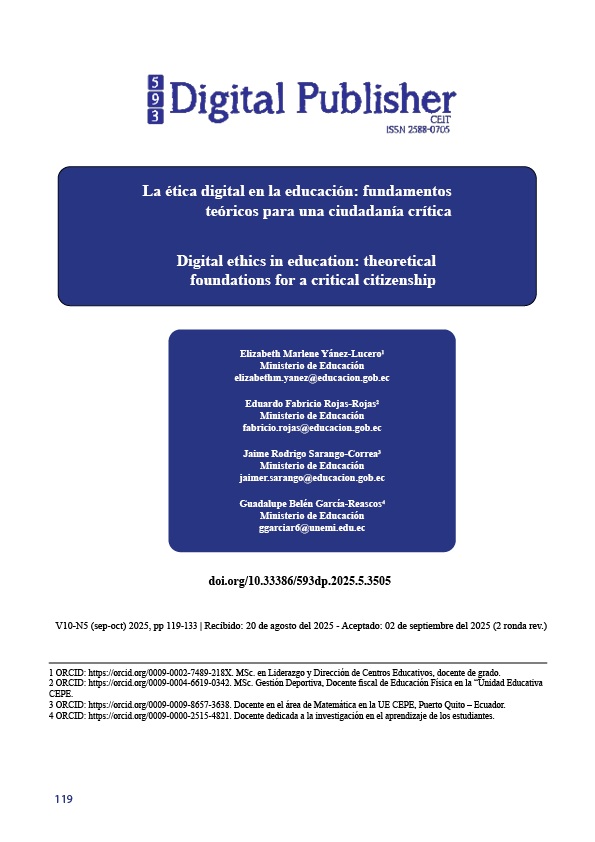Digital ethics in education: theoretical foundations for a critical citizenship
Main Article Content
Abstract
The increasing digitalization of society poses significant ethical challenges in the educational field, demanding the development of a critical digital citizenship. This theoretical article, conducted under a theoretical–documentary approach, explores the conceptual foundations of digital ethics in education, analyzing how institutions and academic literature address the integration of ethical values and principles in the digital age. The issue is contextualized by highlighting the proliferation of online risks (misinformation, cyberbullying, privacy violations) and the need for education that shapes reflective and responsible users. The article provides a review of the main theoretical currents on digital ethics and digital citizenship, emphasizing contemporary debates and conceptual tensions: from the various definitions of digital citizenship to the dichotomy between protective approaches and critical, emancipatory approaches. Finally, the theoretical findings are synthesized, underscoring the urgency of ethical digital education to empower citizens in virtual environments in an equitable, safe, and critical manner, and proposing future lines of research regarding the ethics of artificial intelligence and the formulation of inclusive educational policies.
Downloads
Article Details

This work is licensed under a Creative Commons Attribution-NonCommercial-ShareAlike 4.0 International License.
1. Derechos de autor
Las obras que se publican en 593 Digital Publisher CEIT están sujetas a los siguientes términos:
1.1. 593 Digital Publisher CEIT, conserva los derechos patrimoniales (copyright) de las obras publicadas, favorece y permite la reutilización de las mismas bajo la licencia Licencia Creative Commons 4.0 de Reconocimiento-NoComercial-CompartirIgual 4.0, por lo cual se pueden copiar, usar, difundir, transmitir y exponer públicamente, siempre que:
1.1.a. Se cite la autoría y fuente original de su publicación (revista, editorial, URL).
1.1.b. No se usen para fines comerciales u onerosos.
1.1.c. Se mencione la existencia y especificaciones de esta licencia de uso.
References
Bennett, S., Maton, K. & Kervin, L. (2008). The “digital natives” debate: A critical review of the evidence. British Journal of Educational Technology, 39(5), 775-786.
Buckingham, D. (2019). The Media Education Manifesto. Cambridge: Polity Press.
Choi, M., Cristol, D. & Gimbert, B. (2018). Teachers as digital citizens: The influence of individual backgrounds, internet use and psychological characteristics on teachers’ levels of digital citizenship. Computers & Education, 121, 143-161.
Claro, M., Santana, L.E., Alfaro, A. & Franco, R. (2021). Ciudadanía digital en América Latina: revisión conceptual de iniciativas. Serie Políticas Sociales Nº 239, CEPAL: Santiago de Chile.
da Costa, A. & Freitas, Z. (2025). Digital Ethics and the Future of Education: An Urgent Dialogue. Journal of Educational Technology Innovation and Applications, 1(1), 27-34.
Díaz, A. & Fernández, J. (2019). Hacia una educación para la ciudadanía digital crítica y activa en la universidad. Revista Latinoamericana de Tecnología Educativa, 18(1), 95-105.
Estellés, M. & Doyle, A. (2025). From safeguarding to critical digital citizenship? A systematic review of approaches to online safety education. Review of Education, 13(1), e70056.
Freire, P. (1970). Pedagogía del oprimido. Montevideo: Tierra Nueva.
Gallego-Arrufat, M.J., García-Martínez, I., Romero-López, M.A. & Torres-Hernández, N. (2024). Digital rights and responsibility in education: A scoping review. Education Policy Analysis Archives, 32(3), 1-25.
Gudmundsdottir, G.B. & Hatlevik, O.E. (2018). Newly qualified teachers’ professional digital competence: implications for teacher education. European Journal of Teacher Education, 41(2), 214-231.
Hayes, D., Sevillano, M. & López, R. (2021). Percepciones de padres, docentes y estudiantes sobre riesgos y beneficios de las redes sociales en casa y la escuela. Comunicación y Sociedad, 14(3), 45-62.
Lauricella, A.R., Cingel, D.P., Beaudoin-Ryan, L. & Wartella, E. (2020). Early childhood educators and children’s Internet use. Computers & Education, 146, 103739.
Lupton, D. (2021). Data selves: More-than-human perspectives. Cambridge: Polity Press. (Especialmente capítulo “Educación, datos y privacidad”).
OECD (2021). OECD Digital Education Outlook 2021: Pushing the frontiers with AI, blockchain and robots. Paris: Organisation for Economic Co-operation and Development.
OECD (2025). How’s Life for Children in the Digital Age? Paris: Organisation for Economic Co-operation and Development.
Ribble, M. & Bailey, G. (2011). Digital citizenship in schools (2ª ed.). Eugene, OR: International Society for Technology in Education.
Richardson, J. & Milovidov, E. (2019). Digital Citizenship Education Handbook. Strasbourg: Council of Europe Publishing.
Selwyn, N. (2016). Education and Technology: Key Issues and Debates (2ª ed.). London: Bloomsbury.
UNESCO (2016). A Policy Review: Building digital citizenship in Asia-Pacific through safe, effective and responsible use of ICT. Bangkok: UNESCO.
UNESCO (2024). Preguntas y respuestas: ¿Por qué es esencial la educación digital para la ciudadanía mundial? (Artículo web, 15 de marzo de 2024). París: UNESCO.
Vuorikari, R., Punie, Y., Carretero, S. & Van den Brande, L. (2016). DigComp 2.0: The Digital Competence Framework for Citizens. Luxembourg: Publications Office of the EU.
Zunini, P. (2024, 27 de noviembre). Qué es la ciudadanía digital y por qué UNESCO la impulsa en América Latina. Infobae. Recuperado de https://www.infobae.com/educacion/2024/11/28/que-es-la-ciudadania-digital-y-por-que-unesco-la-impulsa-en-america-latina/





